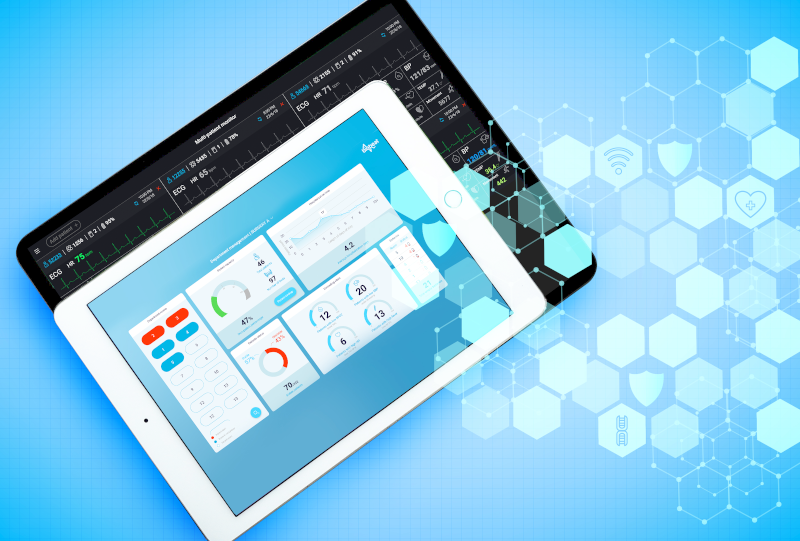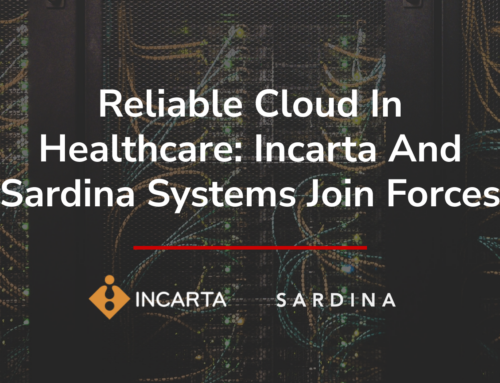Cloud computing is a relatively new concept in healthcare and life science. Traditionally, health care providers and research laboratories have use internally managed infrastructure to provide their computing requirements. However, through the last decade health care systems and analytics platforms have been migrated to the cloud technologies. This has enabled care providers to migrate much of their compute infrastructure to public or private or public clouds thereby heralding a new era of innovation and stability whilst driving down the costs of care delivery. Incarta’s own clinical records and analytic framework was first developed over ten years ago and has always been a cloud only application.
The move to cloud services has been accelerated due to the COVID-19 pandemic with the result that health care providers and life science laboratories who had been hesitant to adopt cloud services before the pandemic have reviewed their requirements and welcomed the cloud.
The factors driving change?
Change always presents opportunity. The pandemic has caused one of the most significant changes structural changes in society in the last century. As a consequence, many industries have realized the need to reshape, and restructure in order to grow and continue to provide products and services to their clients. Healthcare is no exception. Hospitals are overwhelmed with patients, in some cases staff numbers are reduced or staff are furloughed at home and large numbers of patents are being managed via the “hospital in the home” care model. Cloud computing has enabled health care providers to pivot and quickly deploy remotely accessible services whilst still maintaining a patient-centric care model, monitoring patient data remotely and focusing on prevention instead of treatment. For the first time connected real-time services for delivering healthcare in rural areas became possible. The BioBeat clinical wearable integrated with Incarta’s cloud EMR is an example of a new generation of cloud based clinical ecosystems that has enabled health services to continue to provide care to large numbers of local and remote patients.
Healthcare is a strictly regulated industry that deals with sensitive data. It is not surprising that health providers often choose private clouds rather than public clouds for the provision of services. Private clouds offer a compelling solution for mission-critical workloads, high security, data sovereignty and tailored management. Private cloud is the number one choice for regulated business industries, such as medical care, health insurance and medical research, that require a cloud environment separated and defended from a global computer network.
Personal data and privacy?
The Healthcare and Life Science sectors are heavily regulated requirements like Europe’s General Data Protection Regulation (GDPR) for personal data protection, the United States’s Health Insurance Portability and Accountability Act (HIPAA) for secure data portability, and the HITRUST Alliance’s CSF. The industry-mediated certifiable standard for safeguarding sensitive information.
A significant number of data breaches of clinical information have been reported in recent years with one of the most notable resulting from the actions of a large public cloud provider (Google accesses NHS patient data). There is now an awareness amongst patients and health care workers that public cloud services can be compromised and that personally sensitive data may not be secure. In addition to the loss of personal information, data leaks are expensive. In their authoritative 2020 report “Cost of a Data Breach”, the Ponemon Institute has suggested that the healthcare industry represents the sector with the highest costs of data loss and an average time of identification and recovery of 280 days.
Although data security is multi factorial, high levels of security is a hallmark of private clouds. Private clouds can be managed internally in the health provider’s data center or hosted by a reliable partner. Incarta’s private cloud infrastructure can even be deployed as an edge services where the compute notes are within health provider’s data center and the management is within a secure remote data center. Private cloud provides enhanced privacy and security compared with public cloud services, and significantly reduces the vulnerability of systems with sensitive healthcare data.
Medical research institutions and other life science facilities also require the highest level of data protection. New drug formulas, experiment results, research discoveries can all be compromised through security breaches. The software platform that Incarta leverages for private cloud deployments has been used extensively around the world by health services and life science organizations. The German Network for Bioinformatics Infrastructure, chose cloud infrastructure based on OpenStack and Ceph storage for the national de.NBI project.
The tyranny of distance
Accessing data remotely and breaking down geographical barriers is critical to the delivery of healthcare in the age of the pandemic. In this recent study by Ganiga et al. the authors suggest that private clouds are effective in facilitating clinical data access across distributed health services. Private clouds enable fast and secure data access for doctors, nurses, allied health professionals and other medical administrative staff. In Australia where the distances between patients and care providers can be vast, private cloud technologies including Incarta’s Alarta medical record suite and medical emergency team (MET) analytics platform can be used to effectively communicate with and manage remote patients. Sub-acute wearable patient monitors can even stream vital sign data directly from remote patients across the other side of the country into a health provider’s managed private cloud generating real-time alerts and warnings of critical trends in vital signs.
With the coronavirus outbreak, one of Incarta’s clinical partners continuously monitors at risk patients at home hundreds of kilometers from the main hospitals campus. Patients are only triaged for transfer via air ambulance if their condition deteriorates. This is all possible through cloud technology.
Collaboration and Flexibility
Collaboration between doctors, nurses, allied health professionals and care facilities is critical for care delivery. Private clouds enable sharing of facilitates and collaboration whilst maintaining security. Clinical staff can remotely access records and consult colleagues and patients and monitor vital signs in real-time. Private clouds facilitate access at the same time as maintaining control. Private clouds provide health services and life science laboratories with full access and control over the data, eliminating many issues that can occur with shared public cloud platforms.
Private clouds are perfect for supporting constantly evolving environments. They provide healthcare technology professionals with mechanisms to increase or decrease workload volume, adapting it to patient management demands. During the recent acceleration of COVID-19 infection rates, healthcare providers operating on managed private cloud infrastructure can have been able to rapidly scale systems and services and introduce new management tools and maintain security without the need to purchase additional hardware.
Incarta’s managed private cloud is scalable and flexible and is augmented with multi-tenancy and the ability to provision machines rapidly, modify computing resources on-demand, and create complex architectures for large scale compute jobs, like big data.
Incarta’s Private Managed Cloud Service
The Incarta managed private cloud service is secure, highly scalable and supports rapid service deployment of compute, storage, containers and automation. Our systems and services have enabled scientific discoveries and facilitate the delivery of high-quality medical services to remote and local patients across Australia and New Zealand.





